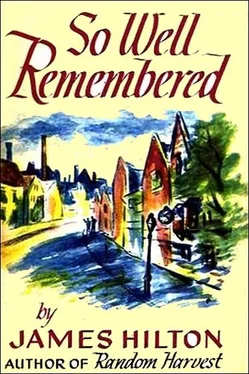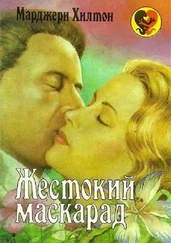Джеймс Хилтон - So Well Remembered
Здесь есть возможность читать онлайн «Джеймс Хилтон - So Well Remembered» весь текст электронной книги совершенно бесплатно (целиком полную версию без сокращений). В некоторых случаях можно слушать аудио, скачать через торрент в формате fb2 и присутствует краткое содержание. Год выпуска: 1945, Жанр: Проза, на английском языке. Описание произведения, (предисловие) а так же отзывы посетителей доступны на портале библиотеки ЛибКат.
- Название:So Well Remembered
- Автор:
- Жанр:
- Год:1945
- ISBN:нет данных
- Рейтинг книги:5 / 5. Голосов: 1
-
Избранное:Добавить в избранное
- Отзывы:
-
Ваша оценка:
- 100
- 1
- 2
- 3
- 4
- 5
So Well Remembered: краткое содержание, описание и аннотация
Предлагаем к чтению аннотацию, описание, краткое содержание или предисловие (зависит от того, что написал сам автор книги «So Well Remembered»). Если вы не нашли необходимую информацию о книге — напишите в комментариях, мы постараемся отыскать её.
So Well Remembered — читать онлайн бесплатно полную книгу (весь текст) целиком
Ниже представлен текст книги, разбитый по страницам. Система сохранения места последней прочитанной страницы, позволяет с удобством читать онлайн бесплатно книгу «So Well Remembered», без необходимости каждый раз заново искать на чём Вы остановились. Поставьте закладку, и сможете в любой момент перейти на страницу, на которой закончили чтение.
Интервал:
Закладка:
“My wife,” said George, as if it were the most natural thing in the world. “She’s visiting friends there.”
“Well, well! You don’t say! Just for the moment I thought they’d appointed you to the League of Nations, and I was wondering how on earth we’d manage without you on the Housing Committee…”
At which they all three laughed.
Just before George saw her off on the London train, Ridyard’s joke put him in mind of something to say at a time when it is always hardest to think of anything to say to anybody. “Geneva must be pretty interesting these days, Livia. There’s probably a place for the public at the League of Nations meetings—you might find some of them worth looking in at… but of course they do everything in French, don’t they?”
“Do they?” she answered. “But I know French, anyhow.”
“You do?”
“Yes.”
“I never knew you did. You never told me.”
“I never told you lots of things.”
“Aye, that’s about it…”
And then the train began to move, and there was no more time for anything but the last shouted goodbyes.
Two hours later he was back in Browdley, desperately unhappy, fighting again to believe that it was just a holiday. But after a little while to get used to it he established a fairly permanent victory over his misgivings; for she wrote several letters, quite normal ones, reporting what sort of a time she was having, where she went, and whom she met. And he, in return, reported upon his own doings in Browdley—his continuing struggle to manoeuvre the housing scheme towards its first stage of accomplishment. When she had been away a couple of months she wrote that she had found a job with a tourist agency, conducting travel parties about Switzerland and Austria, and this, though it seemed to make her near return less likely, reinforced his belief that she was benefiting by the change. After all, it was quite natural not to stay too long as a guest in a friend’s house, and if a temporary job offered itself, was it not sensible to take it? What really cheered him was the knowledge that those tourist-guide jobs WERE temporary—the season began about May and did not last beyond October. So that when October should come…
But before October came, Lord Winslow came, on that First of September, 1921, to lay the foundation stone of the first unit of the Mill Street Housing Scheme.
Part Four
Between 1921 and 1938 much happened in the world; America had the biggest boom and then the biggest slump in history; England went on the gold standard and then off again; Germany rose from defeat to power and then from power to arrogance; flying became a commonplace and radio the fifth estate; people changed from being bored with the last war to being scared of the next —with one short interval of cynical, clinical absorption.
And those were the years during which, in Browdley, the Mill Street Housing Scheme was progressing unit by unit.
One afternoon in the first week of October, 1938, the Mayor of Browdley presided at official ceremonies to mark the scheme’s completion. It had taken a long time, with many intervals of delay and inaction, but at last it was finished, and clusters of cheerful little red-brick semi-detached cottages covered the entire area of what had once been slums. George Boswell himself was also cheerful; in his early fifties he wore both his years and his mayoralty well; except for grey hair he had not changed much, it was remarked, since the day so long before when the foundation stone had been laid upon the first unit.
“Remember that day, George?” someone buttonholed him afterwards. “You had Lord Thingumbob here, and my wife slipped on the way home and busted her ankle—that’s how it sticks in my mind.”
This ancient mishap seemed to amuse the husband more than it did the Mayor, whose face momentarily clouded over as he answered: “Aye, I remember that day.”
“And so you should, after the fight you’ve had. Seventeen years, George, and without a Council majority till lately, so that you couldn’t vote ‘em down, you just had to wear ‘em out… Well, it’s all over now, and a big job well done.”
“Aye, but there’s plenty more to do.”
The cloud then lifted, and the Mayor was seen to be enjoying the triumph he deserved. True, there was no noble lord on hand this time, but there was to have been a personage of equal if not superior importance, none other than a Cabinet Minister—and everyone knew that his absence was not George’s fault, but Hitler’s. George did not like Hitler—for other reasons than that; but now that the Pact of Munich had been signed he could not help seeing a certain symbolism in what had happened—the removal of the threat of war by a last-minute miracle so that the final ceremonies of the Mill Street Housing Scheme could take place as planned. And a further touch: the very same workmen who had erected the flags and platform had been taken right off the job of building an air- raid shelter under the Town Hall. George mentioned this in his speech, and again in a Guardian editorial that concluded:
“We people of Browdley—quiet folks who ask for nothing more than to do our work in peace and live out our lives in decency—we do not profess to understand the complicated geographic, ethnographic, and historical problem of the Sudetenland which has come so close to plunging a whole continent into the infinite disaster of war. We cannot be sure even now that the settlement just reached will be administered fairly to all parties, or whether, in certain phases of the negotiations, the threat of the sword did not prevail over the scales of justice. What we DO know, by and large, is that at the eleventh hour a decision has been made that every honest citizen of every country will endorse in principle—because it is AGAINST WAR. Let every man of Browdley whose death-sentence has thus been commuted, let every woman of Browdley who will not now face sorrow and bereavement, let every child of Browdley who will grow up to inherit a happier world— let them face anew THE TASKS OF PEACE AND RECONSTRUCTION.”
After the ceremonies George walked home across the town and had tea alone in his study—the same study, though enlarged by a bay-window built over the garden, as well as by inclusion of a book-lined alcove that had formerly been part of the lobby. For George’s library was now more certainly than ever the largest private one in Browdley, the years having just about doubled its contents.
Everything else was much the same, including Annie, and the printing-office, and Will Spivey. When George handed in his Munich editorial, the old fellow, a little crustier but otherwise unchanged by the years, read it through, grunted, and said at length: “Do you want this AS WELL AS the one about the new sewage scheme?”
“No,” answered George. “Instead of.”
“What’ll I do with the sewage one then?”
“Keep it till next week.”
But by the next morning George’s slight misgiving about Munich had thriven, and he took the opportunity to cut out that final sentence. Instead he wrote:
“… For the rest, we must wait and see whether Hitler’s word is to be trusted. If his desire for ‘peace in our time’ is as sincere as our own, we should expect to see some corresponding reduction in German armaments, and until we have evidence of this we can only continue, however reluctantly, the process of bringing our own armaments up to a minimum safety-level. THAT THE GOVERNMENT WILL DO THIS WE DO NOT DOUBT.”
George’s optimism had merely swerved in another direction.
Like most Englishmen, he was shocked rather than surprised when war came. 1938 had been the year of hypnosis, the sleep-walk into tragedy, but the first half of 1939 brought a brand of disillusionment that made the actual outbreak of hostilities almost an anti-climax. After that there was so much to be done, and so little time for self-scrutiny, that George was spared the full chagrin of awakening; like all mayors of towns, he found his office had become practically a branch of the national government, with his own tasks and personal responsibilities greatly increased. He shouldered them with gusto from before dawn till often past midnight, while England slowly dissolved into a new era—slowly, it seemed, because it had been natural to expect change and catastrophe overnight. When no bombs fell on London, and when all continued to be quiet along the Western Front, a curious hangover of illusion recurred; it was a ‘phony’ war, said some; perhaps it was not even a war at all. One morning at his editorial desk, aware of this unreality and not knowing how else to handle it, George indulged in a little spree of optimism. After all, he reflected, the good citizens of Browdley deserved a pick-me-up; they had done wonders in response to all his war-emergency appeals, had enlisted splendidly for air-raid protection and civilian defence, and were resolutely creating a strong Home Front while across the Channel hundreds of their sons were already facing the enemy, but so far, thank Heaven, not being killed by him. It was astonishing, compared with the First World War, how few casualties there were along that Western Front. And thinking things out, George composed the following:
Читать дальшеИнтервал:
Закладка:
Похожие книги на «So Well Remembered»
Представляем Вашему вниманию похожие книги на «So Well Remembered» списком для выбора. Мы отобрали схожую по названию и смыслу литературу в надежде предоставить читателям больше вариантов отыскать новые, интересные, ещё непрочитанные произведения.
Обсуждение, отзывы о книге «So Well Remembered» и просто собственные мнения читателей. Оставьте ваши комментарии, напишите, что Вы думаете о произведении, его смысле или главных героях. Укажите что конкретно понравилось, а что нет, и почему Вы так считаете.










